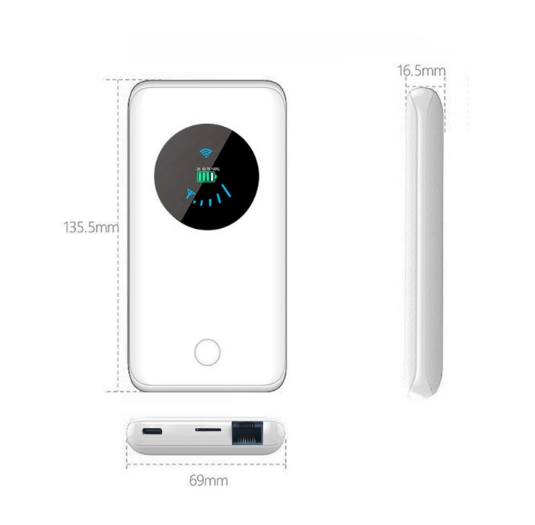MiFi vs WiFi - What's The Difference?
Do you ever find yourself mixing up WiFi and MiFi? You're not alone! Despite their similar-sounding names, WiFi and MiFi are distinct entities.
In this blog, we’ll delve into what WiFi and MiFi are, shedding light on their definitions and notable differences.
What is WiFi?
When discussing WiFi, the term generally evokes the idea of "wireless internet." However, it’s important to clarify that WiFi itself is not synonymous with internet access.
WiFi, short for wireless fidelity, refers to a wireless networking protocol based on IEEE 802.11 standards. This technology allows devices such as smartphones, tablets, laptops, and other WiFi-enabled equipment to connect to the internet without the need for physical cables.
Essentially, WiFi-enabled devices connect wirelessly to a WiFi router or access point, which is connected to an internet service provider. As long as you stay within the coverage area of the router, you can effortlessly stream and browse the web from virtually anywhere.
Though connecting to the internet without WiFi is possible through ethernet cables, its convenience has led to widespread adoption in homes, workplaces, cafés, airports, and other public venues.
What is MiFi?
MiFi functions as a compact, portable wireless router or hotspot device that comes equipped with integrated WiFi technology. It leverages your mobile carrier's LTE, 4G, or 5G network to create an ad hoc WLAN (Wireless Local Area Network), enabling internet access while on the move or in places lacking conventional broadband infrastructure.
Different from traditional WiFi routers, MiFi devices do not need a direct connection to an internet service provider; they only require cellular service. With a MiFi device, you can connect to the internet as long as there is an available cellular signal.
Without WiFi technology, mobile internet access would be significantly limited.
What’s the Difference Between WiFi and MiFi?
WiFi is a technology that facilitates wireless internet connectivity and is incorporated in various devices, including standard internet routers, cellular routers, mobile hotspots, MiFi units, smartphones, tablets, and more. A WiFi network can be established through either an internet service provider or a cellular network, depending on how you access WiFi.
MiFi, on the other hand, refers specifically to a type of WiFi access point. With a range of MiFi models available, you can choose one that suits your needs. These devices allow WiFi-enabled gadgets to connect to the internet via the cellular network. They are portable and convenient, ensuring connectivity even when you're away from your home WiFi setup.
It's important to note that MiFi relies on a cellular signal for operation, and weak cell reception can negatively impact data speeds for all connected devices.
You May Not Know About MiFi and WiFi
1) WiFi: Not an Acronym
Contrary to common belief, WiFi is not an acronym. It does not stand for Wireless Fidelity, Wireless Fiber, or any other specific phrase.
Before adopting a name for the wireless networking standard, it was essential to select something easily memorable and understandable. "IEEE 802.11" was not appealing enough. The branding agency Interbrand suggested "WiFi" for its phonetic similarity to "HiFi" (High Fidelity), which resonated with consumers and aided comprehension.
In essence, WiFi simply represents itself.
2) MiFi: A Term for Portable Hotspot Devices
The term "MiFi" was introduced in 2009 by Novatel Wireless (now Inseego) for their range of portable WiFi devices.
Today, "MiFi" has become a catch-all term for a variety of portable hotspot devices, including cellular routers and mobile hotspots.
3) Traditional WiFi vs. MiFi Speeds
Compared to traditional WiFi networks established by an Internet Service Provider (ISP), MiFi devices may offer slower speeds due to their reliance on cellular networks. A variety of factors, such as terrain, proximity to cell towers, network congestion, weather conditions, and building materials, can influence the signal quality for MiFi devices. Thus, performance can fluctuate with changes in location.
However, with the emergence of 5G technology, MiFi speeds could potentially match or even exceed traditional broadband internet speeds, although widespread availability of ultra-fast 5G is still on the horizon.
4) Security: Public WiFi vs. MiFi
While public WiFi hotspots offer convenience, they come with significant security risks due to their accessibility to hackers. Data transmitted over public networks is often unencrypted, making it easy for hackers to intercept personal information.
In contrast, MiFi devices create a personal WiFi network, limiting access and using encryption for data transmission, which enhances security.
5) MiFi as a Home Internet Solution
Although wireless broadband internet is standard for homes and businesses, not everyone has access to such services; in some areas, broadband costs can be exorbitantly high.
MiFi serves as a feasible alternative for home internet access, operating wherever there is cellular coverage and often at a more affordable price. Yet, it may not be suitable for every household due to limitations regarding data, speed, and bandwidth.
6) Enhancing MiFi Performance with a Cell Phone Booster or Upgraded Antenna
The performance of MiFi devices is directly linked to the strength of the cellular signal. In regions with strong signal coverage, connected devices experience improved data speeds. Conversely, poor signal areas result in diminished performance.
Whether the weak signal originates from distant cell towers or obstructions caused by building materials, a cell phone booster can enhance MiFi performance by amplifying the external cellular signal, leading to better reception and transmission within your home, office, or vehicle.
- 0




